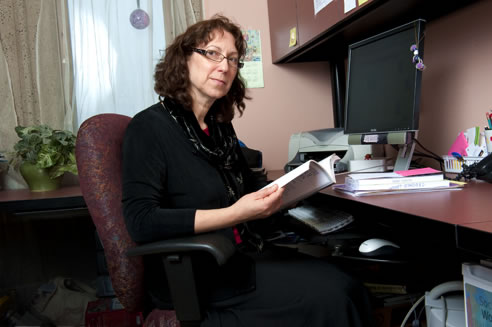Community Commitment to Serve Older Adults
Jean Schuldberg, MSW, EdD
Associate Professor and MSWProgram Director
California State University, Chico
School of Social Work
 (Above) Dr. Schuldberg in her office at the School of Social Work, California State University, Chico.
(Above) Dr. Schuldberg in her office at the School of Social Work, California State University, Chico.
“Because of the large population of older adults in our region, there’s a strong community commitment to serving older adults,” says Jean Schuldberg, MSW, EdD, Associate Professor in the School of Social Work at California State University, Chico. The college is located in a rural environment serving 12 counties. In this area, about 14.5 percent of the population is older adults, compared to 10 percent in the entire state of California. “Some older adults in this region are caring for their grandchildren because of a problem with methamphetamine abuse,” says Dr. Schuldberg. Consequently, social workers in many different settings, including child welfare, interact with older adults.
In 2001 the California state legislature mandated that state universities provide curricula and training in gerontology for anyone who will be working in careers that serve older adults, including nurses, social workers, and psychologists. The demographics and this unfunded legislative mandate set the stage for the university to find ways to train social workers to be more proficient in working with older adults.
The School of Social Work at California State University, Chico was awarded the GeroRich grant in 2001 to infuse aging content into the curriculum of master’s and bachelor’s level courses. “As a result, all the foundation and core courses in the BSW and MSW programs address lifespan and intergenerational issues and ageism,” says Dr. Schuldberg. The School of Social Work also increased internship field sites from just a few to 14 and produced a recruitment video, called “Voices in the Field: Social Work with Older Adults,” which included consumers, agency workers, and students. The video was distributed to all GeroRich sites and continues to be used by social work programs in classes and for recruitment.
Based on the success of these efforts, Dr. Schuldberg was subsequently invited to be a mentor to faculty from California universities through the Curriculum Development Institutes, which are a component of the currently funded Gero-Ed Center. In 2006, the School of Social Work applied for the Hartford Partnership Program for Aging Education, which provides funding for field placements for master’s level students. “This continued the establishment of gerontology within our program,” says Dr. Schuldberg. At that time, the school had two areas of focus: family/children/youth and mental health. In May 2009, the faculty approved gerontology as a third area of focus in the program. The university also approved the development of an Interdisciplinary Center on Aging on the Chico campus.
“Everything has fit together because our community is collaborative, our faculty are supportive, and we’ve received buy-in from many people,” says Dr. Schuldberg. “The Hartford programs really cultivate collaboration and sharing of resources, which has been essential.”
Next: Field Placements in Aging Settings ›
